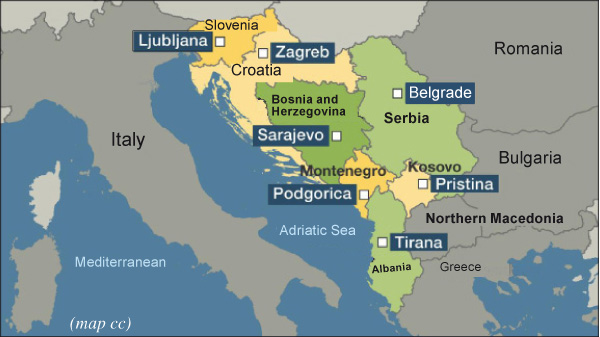Lessons from the recent past
Serbia, Albania and North Macedonia plan a closer cooperation

(Picture ef)
by Willy Wimmer
km. The Berlin daily “Tagesspiegel”, probably the only German-language newspaper to report on a meeting between Albania’s head of government Rama, Serbia’s president Vučić and Northern Macedonia’s prime minister Zaev, reported on 14 October. The three politicians decided to promote the regional cooperation by forming a “mini-Schengen zone”. Starting in 2021 there will be free movement of people, goods, services and capital between the three countries. The initiative is also open to other Western Balkan states. Differing opinions regarding Kosovo should not hinder increasing cooperation. It was high time that the Balkan countries “do something in their own interest”. Albania’s head of government Rama pointed out that the initiative was implemented without any influence from Brussels. But it is necessary to “accelerate the pace and dynamics of development” throughout the region. Rama added: “We are not a priority for the EU. That is why we have to set our own priorities. The next meeting of the three states is scheduled for 10 November at Lake Ohrid in North Macedonia, where more concrete measures for realising the “mini-Schengen area” will be presented. Willy Wimmer, former State Secretary in the German Ministry of Defence and Vice-President of the Parliamentary Assembly of the OSCE, commented the event as follows:
Of course, the sensational news of 8 October from the Serbian city of Novi Sad went unnoticed in the rest of Europe. Why should they look there when they are fully preoccupied with their own failure? Three presidents met in the generally hostile area of the Central Balkans. The Serbian, Albanian and Macedonian presidents honoured each other, and they did some straight talking: How do we finally bring our people forward after decades of misery? One has to look at the big picture, namely a considerable economic area of about 20 million people who are waiting to stay in their homeland instead of spending their future in Sindelfingen or Bottrop. In Novi Sad, the interests of the people were combined. That is more than understandable because there are certainly lessons to be learned from the past decades. Do the taxfree double salaried teams really have the interest of the people between Tirana, Belgrade and Skopje at heart?
It is a recurring theme: all approaches of the Western Europeans had one aspect in mind: no solutions were to be found in the Balkans that could put an end to the misery. Great Britain is a prime example. Meticulous care was taken to ensure that only regulations could be found which would not have an explosive effect at home on the obvious problems on the island. London’s control over Edinburgh, Cardiff and Belfast was defended in Pristina. The link between the German economy and the Balkan states was cut by the sanction’s negotiations. It is known what has played and still plays a role in the Balkans. This also applies, of course, to the Americans, whose main interest in the Balkans was to keep Russia out.
The fact that the American ambassador in Berlin, Mr Grenell, was appointed as special ambassador for the Balkans now speaks for itself. The highly equipped American administrative apparatus seems to be in need of grounding; in the Balkans the people no longer wait for directives from outside. Finally, they are taking things into their own hands. No longer do the moods and necessities of Brussels, Paris, London and Berlin, let alone of Washington, exclusively determine reality in the Balkans. Not even because Tirana and Belgrade are talking to each other. It is obvious that Pristina and Belgrade, due to the developments of recent decades, have been or had to be at each other’s throats. Why make relations between Albanians and Serbs dependent on the mafia structures in Pristina? They can just as well talk directly to each other.
From the area only European obscurities can be “admired”. People in Belgrade are talking about rules during elections. Western European parliamentarians and officials are sitting together with Serbian forces talking about “freedom of the press”. It dawns on the Serbs that in the last thirty years the freedom and diversity of the press in Western Europe have long since gone down the drain. In Belgrade the Europeans are recommending something they left to the oligarchs at home without a fight. What should we do with such advisers? •
(Translation Current Concerns)
